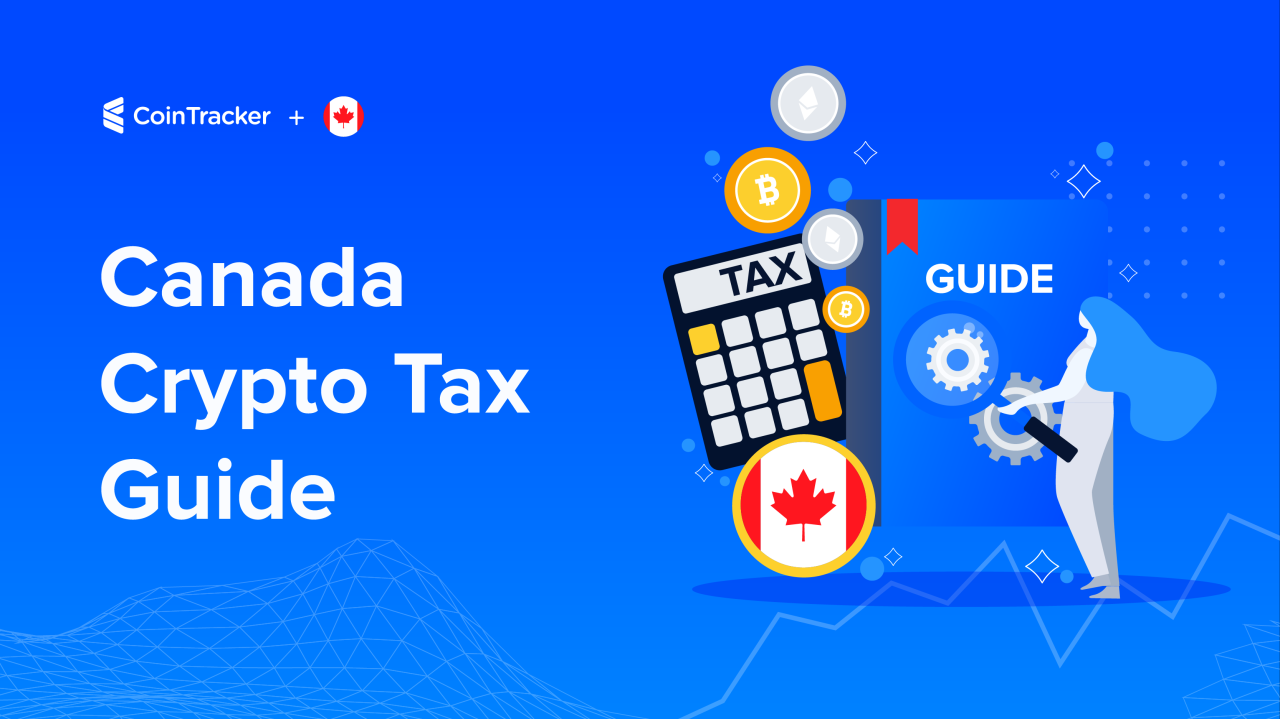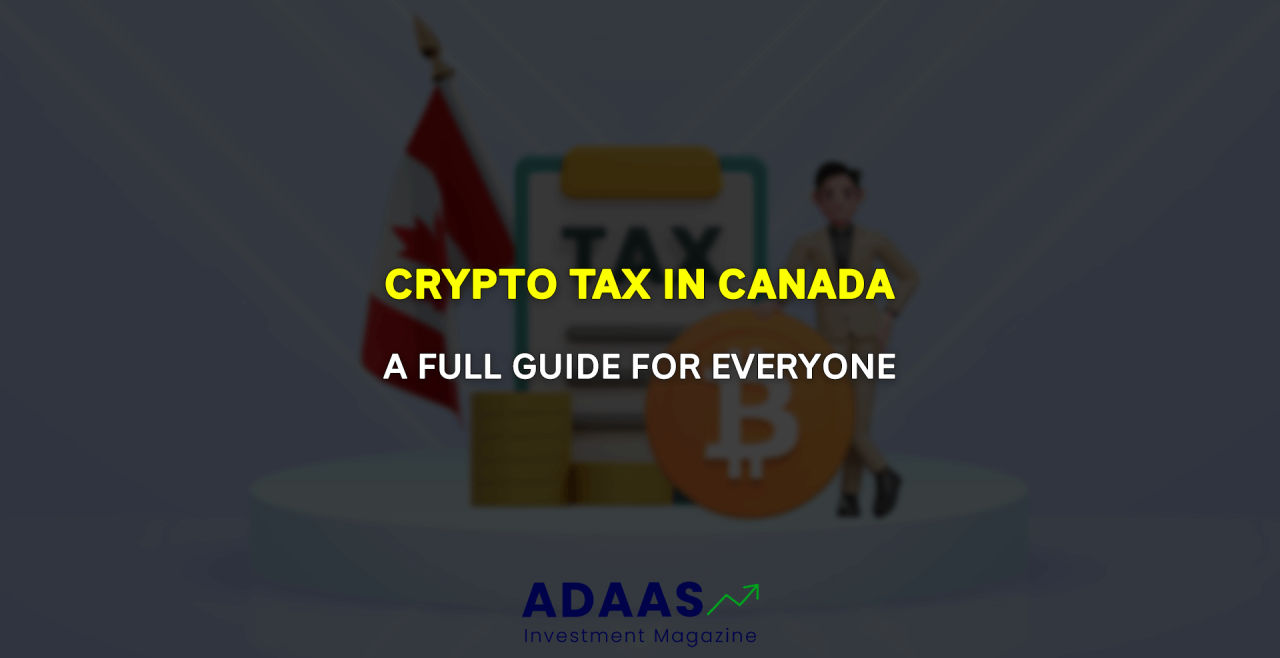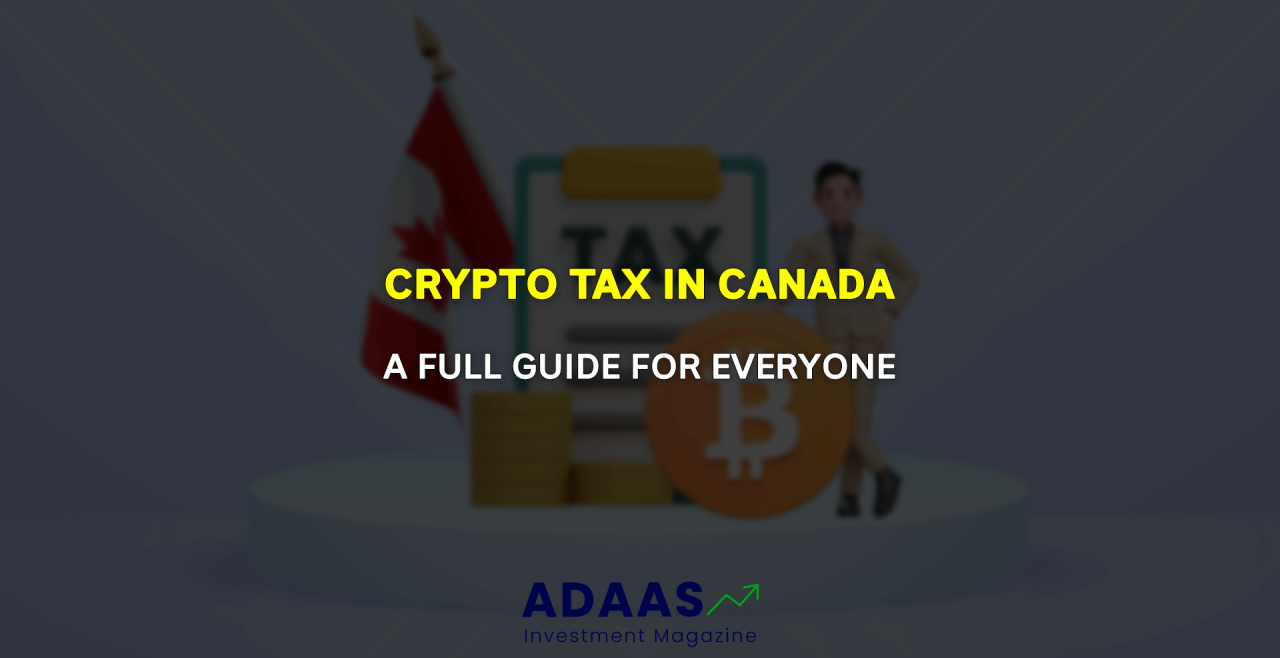Understanding the tax implications of crypto trading in Canada: Prepare yourself for a wild ride through the exhilarating, yet sometimes bewildering, world of Canadian crypto taxes! Think of it as a thrilling treasure hunt, where the treasure is…well, keeping your hard-earned crypto gains out of the clutches of the taxman. This isn’t your grandpappy’s tax return; we’re talking about digital assets, blockchain technology, and enough jargon to make your head spin.
But fear not, intrepid crypto adventurer! This guide will illuminate the path, revealing the secrets to navigating the Canadian tax system’s crypto-verse.
This guide delves into the complexities of Canadian tax law as it applies to cryptocurrency, covering capital gains taxes on trading, the often-overlooked tax implications of mining and staking, the importance of meticulous record-keeping, and the specific tax treatment of gifted or inherited crypto. We’ll break down complex concepts into easily digestible chunks, providing clear explanations and practical examples to help you confidently navigate the Canadian Revenue Agency’s (CRA) crypto tax landscape.
We’ll even share some common pitfalls to avoid, saving you from potential tax headaches down the line. Get ready to become a crypto tax pro!
Capital Gains Tax on Crypto in Canada
Navigating the Canadian tax system with cryptocurrency can feel like trying to solve a Rubik’s Cube blindfolded – tricky, but not impossible! Let’s unravel the mysteries of capital gains tax on your digital assets. Remember, this information is for general understanding and doesn’t constitute professional tax advice. Always consult a qualified accountant or tax professional for personalized guidance.
Calculating Capital Gains Tax on Cryptocurrency Transactions
Calculating your capital gains tax on crypto involves determining your profit (or loss) from each transaction. This is done by subtracting your adjusted cost base (ACB) from the proceeds of disposition. Your ACB is essentially what you originally paid for the cryptocurrency, including any fees associated with the purchase. The proceeds of disposition are what you received when you sold or exchanged the crypto.
The difference is your capital gain (or loss). Only 50% of your capital gain is then included in your taxable income.
Reporting Cryptocurrency Capital Gains on a Canadian Tax Return
Reporting your crypto gains is done on Schedule 3 of your Canadian tax return (T1). You’ll need to carefully track all your transactions, including the date of acquisition, the date of disposition, the amount paid, and the amount received for each cryptocurrency you traded. Accurate record-keeping is crucial; think of it as your digital financial diary. The CRA (Canada Revenue Agency) expects detailed information, so be prepared!
Tax Rates Applicable to Capital Gains from Crypto Trading
Your tax rate on capital gains depends on your total taxable income, including the 50% of your crypto capital gains that’s added to it. Canada uses a progressive tax system, meaning higher income brackets face higher tax rates. This means that someone earning a higher salary will pay a larger percentage of their crypto profits in taxes compared to someone with a lower income.
The exact rate will vary from year to year, so always refer to the current CRA guidelines.
Comparison of Crypto Gains Tax Treatment with Other Capital Gains
The tax treatment of cryptocurrency gains is largely similar to other capital gains in Canada, such as those from stocks or bonds. The key difference lies in the record-keeping; tracking crypto transactions can be more complex due to the decentralized nature of the market and the various exchanges involved. However, the fundamental principle of calculating 50% of the gain and adding it to your income remains the same.
Hypothetical Scenario: Calculating Capital Gains Tax on Cryptocurrency Sale
Let’s say you bought Bitcoin in 2022 and sold it in
2023. Here’s a breakdown of a hypothetical scenario
Navigating the Canadian crypto tax landscape can feel like a wild goose chase, especially when you’re juggling gains and losses. Before you dive headfirst into those complicated tax forms, however, consider your trading platform options; perhaps checking out a demo account could help. A good place to start comparing is by looking at Comparing Forex.com Demo Account with Other Canadian Brokers , to ensure you’re using a platform that suits your needs and helps you keep better track of your trades for tax purposes.
Then, and only then, should you tackle those crypto tax returns – armed with the right tools, you’ll conquer those tax implications like a pro!
| Date | Transaction Type | Amount (CAD) | Capital Gain/Loss (CAD) |
|---|---|---|---|
| 2022-05-15 | Purchase | 1000 | – |
| 2023-03-20 | Sale | 2000 | 1000 |
In this example, your capital gain is $1000. You’ll include 50% of this ($500) in your taxable income, and the tax you owe will depend on your overall tax bracket. Remember, this is a simplified example and doesn’t account for potential fees or other complexities.
Tax Implications of Cryptocurrency Mining in Canada

So, you’ve decided to join the ranks of digital gold prospectors, panning for Bitcoin in the virtual Klondike? Congratulations! But before you start celebrating with stacks of freshly-mined cryptocurrency, let’s talk taxes. Navigating the Canadian tax system when it comes to crypto mining can be trickier than solving a particularly stubborn SHA-256 hash, so buckle up.
In Canada, the tax implications of cryptocurrency mining hinge on how the Canada Revenue Agency (CRA) classifies your mining activities: as a business or as a hobby. This classification significantly impacts how your income is taxed and what expenses you can deduct. Think of it like this: if you’re mining as a serious business, you get more tax breaks; if it’s more of a weekend hobby, your options are more limited.
The CRA will look at factors like the scale of your operation, your level of organization, and your intention to make a profit. Essentially, they’ll want to see if you’re in it for the long haul (and the tax deductions) or just tinkering around.
Navigating the Canadian tax code for crypto trading can feel like deciphering ancient hieroglyphs, especially when comparing it to the (relatively) straightforward world of forex. But before you dive headfirst into those Bitcoin tax returns, consider the fees involved in forex trading itself – check out this handy comparison of platforms: Compare Forex Trading Platforms in Canada: Fees and Features.
Understanding those forex costs can help you better budget for potential crypto tax liabilities, preventing a future audit from turning into a financial apocalypse.
Classification of Cryptocurrency Mining Income
The CRA’s determination of whether your crypto mining activities constitute a business or a hobby is crucial. Business income is taxed at your marginal tax rate, while income from a hobby is taxed as property income, usually at a lower rate. However, the line between business and hobby can be blurry. The CRA considers various factors, including the scale of your operation, your level of organization, the time and effort you invest, and your intention to generate profit.
A large-scale operation with sophisticated equipment and meticulous record-keeping points towards a business, while casual mining with limited equipment and effort suggests a hobby. If deemed a business, you can deduct a wider range of expenses.
Accounting for Expenses Related to Cryptocurrency Mining
Let’s get down to the nitty-gritty: expenses. If your mining operation is classified as a business, you can deduct several expenses to reduce your taxable income. These can include:
- Cost of Mining Equipment: This includes the purchase price of computers, graphics cards, power supplies, and other hardware. You can’t deduct the entire cost in one year; instead, you’ll depreciate it over its useful life. Think of it as a slow, steady drip of tax savings rather than a massive waterfall.
- Electricity Costs: Mining consumes a lot of power. Fortunately, you can deduct the portion of your electricity bill directly attributable to your mining operation. Keep detailed records of your energy usage!
- Internet Costs: A stable internet connection is essential. You can deduct the portion of your internet bill related to mining.
- Software and Maintenance Costs: The software you use for mining and the maintenance of your equipment are also deductible expenses.
- Accounting and Legal Fees: The cost of professional advice to help you navigate the complexities of crypto tax is a deductible business expense.
Potential Tax Deductions for Canadian Cryptocurrency Miners
The CRA allows for several deductions, significantly impacting your tax liability. Properly claiming these deductions is crucial for minimizing your tax burden. Remember, meticulous record-keeping is key to successfully claiming these deductions. It’s like keeping a detailed ledger in a gold rush – the more accurate your records, the more gold (tax savings) you’ll find.
Navigating the Canadian crypto tax landscape can feel like a wild goose chase, especially when you’re juggling profits and losses. But before you start frantically searching for your tax receipts, choosing the right exchange is crucial! Check out this comparison: Comparing Phemex and NDax for Canadian crypto traders to make sure your platform is helping, not hindering, your tax planning.
Then, armed with this knowledge, you can conquer those tax returns and maybe even treat yourself to a celebratory crypto-purchase (after carefully considering the tax implications, of course!).
Common Mistakes Canadian Cryptocurrency Miners Make When Filing Their Taxes
Let’s learn from the mistakes of others to avoid a tax-related headache. Here are some common pitfalls:
- Poor Record Keeping: Failing to maintain detailed records of all income, expenses, and transactions is a recipe for disaster. The CRA needs proof, and vague recollections won’t cut it.
- Incorrect Classification of Income: Misclassifying mining income as a hobby instead of a business can lead to underpayment of taxes.
- Ignoring GST/HST: If your mining operation is registered for GST/HST, you must remit the tax collected on any sales. Ignoring this can lead to penalties and interest.
- Not Claiming All Deductible Expenses: Failing to claim legitimate business expenses will increase your tax liability.
- Failing to Report All Income: Underreporting income is a serious offense with potentially severe consequences. Be honest, and the CRA might just be nice.
Staking and Lending Crypto: Understanding The Tax Implications Of Crypto Trading In Canada
So, you’ve ventured into the wild world of cryptocurrency, maybe even dabbled in trading and mining. But now you’re eyeing those juicy staking rewards and the tempting interest offered on crypto lending platforms. Before you dive headfirst into this lucrative-sounding pool, let’s wade through the murky waters of Canadian tax implications. It’s less about dodging taxes and more about understanding how to navigate them – think of it as a treasure hunt, where the treasure is…well, less tax owed.Staking and lending crypto in Canada are considered taxable events, meaning those sweet rewards and interest aren’t tax-free gifts from the crypto gods.
The CRA (Canada Revenue Agency) views these activities as generating income, subject to taxation. The specific type of income and therefore the tax rate will depend on several factors, including the type of cryptocurrency involved, the platform used, and the length of time you’ve held the crypto.
Tax Treatment of Staking Rewards and Lending Income
Staking rewards and interest earned from lending cryptocurrency are generally considered taxable income in Canada. This income is typically classified as either business income or capital gains, depending on the nature of your activities. If you’re actively involved in staking and lending, frequently participating in various projects, the CRA might consider this a business and tax the income accordingly.
Navigating the Canadian crypto tax landscape can feel like trying to solve a Rubik’s Cube blindfolded – especially when gains are involved! Understanding your tax obligations is crucial, and surprisingly, it can even relate to global market timing. For instance, knowing when the forex markets are open (check out this helpful guide: Understanding Forex Market Hours in Canada and Global Markets ) might influence your crypto trading strategies and subsequently, your tax reporting.
So, keep your receipts, and your calendar, handy!
However, if your activities are more passive, akin to a long-term investment, the rewards might be taxed as capital gains. The difference is significant, as business income is taxed at your marginal tax rate, while capital gains are taxed at half your marginal tax rate.
Reporting Staking Rewards and Lending Income
Reporting your crypto income on your Canadian tax return requires careful record-keeping. You need to track all transactions, including the date you received the rewards or interest, the amount received (in both cryptocurrency and CAD equivalent at the time of receipt), and the platform used. You’ll report this income on Schedule 1 of your tax return (T1 General), using the appropriate box for either business income or capital gains.
For example, if you earned 1 BTC worth $30,000 CAD in staking rewards, you would report this amount on your return, reflecting the equivalent CAD value at the time of receipt. Failing to report this income could lead to penalties and interest.
Comparison of Staking and Trading Tax Implications
The key difference between the tax implications of staking versus trading lies in the classification of the income. Trading crypto typically results in capital gains or losses, depending on whether you sold your crypto for a profit or loss. The capital gain or loss is calculated based on the difference between the cost of the crypto and its sale price.
Staking, on the other hand, generates income directly in the form of rewards, which is taxed differently as previously explained. Trading involves more frequent transactions and higher volatility, leading to potentially larger tax liabilities or significant tax deductions. Staking is generally considered a more passive income stream, although the tax implications can still be substantial.
Tax Implications of Decentralized Finance (DeFi) Platforms
Using DeFi platforms for staking and lending adds another layer of complexity. While the underlying tax principles remain the same, the decentralized nature of these platforms can make tracking transactions more challenging. You’ll need to meticulously track all transactions, including the fees paid on these platforms, which are also tax-deductible. The anonymity offered by some DeFi platforms doesn’t shield you from the CRA; accurate record-keeping is crucial.
The CRA is increasingly scrutinizing DeFi activities, so ensuring compliance is paramount.
Tax Treatment of Different Crypto Activities, Understanding the tax implications of crypto trading in Canada
| Activity | Income Type | Taxable Event | Tax Rate |
|---|---|---|---|
| Trading | Capital Gain/Loss | Sale of cryptocurrency | 50% of your marginal tax rate |
| Mining | Business Income | Receipt of cryptocurrency as reward | Your marginal tax rate |
| Staking | Business Income or Capital Gain | Receipt of staking rewards | Your marginal tax rate or 50% of your marginal tax rate |
| Lending | Business Income or Interest Income | Receipt of interest payments | Your marginal tax rate |
Record Keeping for Cryptocurrency Transactions

Navigating the wild west of crypto trading in Canada? Buckle up, because keeping accurate records is your ticket to avoiding a tax-audit rodeo. The CRA (Canada Revenue Agency) isn’t messing around when it comes to crypto taxes, so let’s get organized and avoid any unwanted surprises. Think of meticulous record-keeping as your crypto insurance policy – a small price to pay for peace of mind.Proper record-keeping is crucial for accurately calculating your capital gains or losses on cryptocurrency transactions.
Navigating the complex world of Canadian crypto taxes can feel like deciphering an ancient scroll, but hey, at least it’s less spicy than figuring out the perfect blend of spices for a delicious halal culinary masterpiece! Once you’ve conquered the CRA’s crypto regulations, you’ll have more time for important things, like perfecting your biryani recipe. Back to taxes though – remember to keep meticulous records, or you might end up with a tax bill hotter than your favorite vindaloo.
Without detailed records, determining your taxable income becomes a Herculean task, potentially leading to significant penalties and interest charges. Remember, the CRA expects you to be able to substantiate every single crypto transaction. So, let’s get down to the nitty-gritty.
Essential Information for Each Cryptocurrency Transaction
Maintaining a comprehensive record of each transaction is paramount. This ensures you can easily reconcile your transactions with your tax filings. Missing information can lead to delays and potential penalties. Consider this your crypto accounting 101.
Navigating the Canadian tax code for crypto trading can feel like deciphering ancient hieroglyphs – but before you lose your shirt (or your Bitcoin!), understanding the basics is key. If you’re looking to diversify your financial knowledge, maybe consider a less volatile arena first, like forex; check out this beginner’s guide for Canadians: Forex Trading Education Resources for Canadians: Beginners Guide.
Then, armed with a bit more financial savvy, you can tackle those crypto tax returns with the confidence of a seasoned pro (or at least, someone who won’t end up owing the CRA a fortune).
- Date of Transaction: The date the transaction occurred (purchase, sale, trade, etc.).
- Type of Transaction: Specify whether it was a purchase, sale, trade, airdrop, mining reward, staking reward, or other transaction type.
- Cryptocurrency Involved: Clearly state the name and ticker symbol of the cryptocurrency (e.g., Bitcoin (BTC), Ethereum (ETH)).
- Quantity of Cryptocurrency: Record the exact amount of cryptocurrency involved in the transaction.
- Acquisition Cost (CAD): The cost in Canadian dollars at the time of acquisition, including any fees.
- Disposition Proceeds (CAD): The proceeds from the sale or trade in Canadian dollars, including any fees.
- Transaction Fees (CAD): Record all fees associated with the transaction, including network fees, exchange fees, and any other applicable charges.
- Exchange/Platform Used: Specify the name of the exchange or platform where the transaction took place.
- Transaction ID/Confirmation Number: Record the unique identifier provided by the exchange or blockchain for each transaction. This acts as irrefutable proof.
Best Practices for Organizing and Storing Cryptocurrency Transaction Records
Organizing your crypto transactions might sound like a chore, but it’s a necessary evil. Think of it as spring cleaning for your financial life – you’ll thank yourself later. Here’s how to make this process as painless as possible.
Consider using a combination of methods to ensure both security and accessibility of your records:
- Spreadsheet Software: Create a spreadsheet (as detailed below) to record all transactions. This provides a clear, organized overview.
- Cloud Storage: Store a backup copy of your spreadsheet in a secure cloud storage service (Google Drive, Dropbox, etc.). This safeguards against data loss.
- External Hard Drive: Store another backup on an external hard drive for extra security.
- Regular Backups: Regularly back up your data to prevent loss due to technical issues or accidental deletion.
Potential Penalties for Inadequate Record-Keeping
The CRA takes record-keeping very seriously. Failing to maintain proper records can result in hefty penalties, including interest charges, reassessments, and even legal action. Think of it as a crypto tax boogeyman – best to avoid it.
Penalties can range from additional taxes and interest to legal fees and even criminal charges in cases of willful non-compliance. The amount of the penalty will depend on the severity of the non-compliance.
Creating a Simple Spreadsheet to Track Cryptocurrency Transactions
A simple spreadsheet can be your best friend when it comes to crypto tax season. It’s easier than wrestling a bear (and less messy!).
Here’s a suggested spreadsheet layout:
| Date | Transaction Type | Cryptocurrency | Quantity | Acquisition Cost (CAD) | Disposition Proceeds (CAD) | Fees (CAD) | Exchange/Platform | Transaction ID |
|---|---|---|---|---|---|---|---|---|
| 2023-10-26 | Purchase | BTC | 0.01 | $3000 | $5 | Binance | 1234567890 | |
| 2023-11-15 | Sale | BTC | 0.01 | $3500 | $10 | Kraken | 9876543210 |
Tax Implications of Gifting or Inheriting Cryptocurrency
Navigating the world of cryptocurrency taxes in Canada can feel like trying to solve a Rubik’s Cube blindfolded – tricky, but not impossible! Let’s untangle the complexities of gifting and inheriting crypto, focusing on the Canadian tax landscape. Understanding these implications is crucial to avoid a future headache with the Canada Revenue Agency (CRA).
Gifting Cryptocurrency in Canada
Gifting cryptocurrency in Canada triggers a deemed disposition for thegiver*. This means the CRA considers the giver to have sold their crypto at its fair market value on the day of the gift. The giver then needs to calculate any capital gains and report them on their tax return. The recipient, however, does not pay tax at the time of the gift; their cost base becomes the fair market value on the day they received the gift.
This means that any subsequent sale will be taxed based on the difference between the fair market value at the time of the gift and the selling price. Think of it as a delayed tax bill for the giver, and a shifted cost base for the receiver.
Inheriting Cryptocurrency in Canada
Inheriting cryptocurrency is treated differently. The fortunate inheritor receives the crypto with a cost base equal to its fair market value on the date of death of the deceased. This means that any subsequent sale of the inherited crypto will result in a capital gain or loss calculated from that date. Unlike gifting, there’s no immediate tax liability for the inheritor.
The executor of the estate is responsible for reporting the fair market value of the cryptocurrency on the deceased’s final tax return. This is a key difference from gifting – the tax burden shifts entirely to the inheritor upon sale.
Comparison of Gifting and Inheriting Cryptocurrency
The primary difference lies in the timing and party responsible for the immediate tax liability. Gifting triggers an immediate capital gains tax for the
- giver*, while inheriting only triggers a tax liability for the
- recipient* upon the subsequent sale of the crypto. The cost base is also determined differently – the fair market value at the time of the gift for gifted crypto, and the fair market value at the time of death for inherited crypto. This difference significantly impacts the final tax calculation.
Examples of Capital Gains Tax Calculation
Let’s illustrate with examples. Suppose Alice gifts Bob 1 Bitcoin worth $30,000 on January 1st. Alice’s cost base was $10,000. Alice will have a capital gain of $20,000 ($30,000 – $10,000). She reports this on her tax return.
Bob’s cost base becomes $30,000. If Bob sells the Bitcoin later for $40,000, his capital gain is only $10,000.Now, let’s say Carol inherits 1 Bitcoin worth $30,000 from her uncle who passed away. Her uncle’s cost base was $10,000. Carol’s cost base becomes $30,000. If Carol sells the Bitcoin for $40,000, her capital gain is $10,000.
Notice how the initial cost base is irrelevant for Carol; only the value at the time of inheritance matters.
Reporting Requirements for Gifted and Inherited Cryptocurrency
For gifted cryptocurrency, the giver must report the capital gain on their tax return using the appropriate forms (T1 General, Schedule 3). For inherited cryptocurrency, the executor must report the fair market value on the deceased’s final tax return. The inheritor reports any capital gains or losses upon the sale of the inherited crypto on their own tax return.
Accurate record-keeping is paramount in both situations, including transaction dates, acquisition costs, and fair market values. Failure to accurately report can lead to penalties and interest from the CRA. Consider seeking professional tax advice if you’re unsure about the complexities of reporting your cryptocurrency transactions.
Final Wrap-Up

So, there you have it – a whirlwind tour of the Canadian crypto tax landscape! While the world of digital currencies may seem daunting at first, understanding the tax implications doesn’t have to be a crypto-calypse. By diligently keeping records, understanding the different tax classifications of crypto activities, and seeking professional advice when needed, you can confidently navigate this exciting and ever-evolving financial frontier.
Remember, a little preparation goes a long way in ensuring a smooth tax season, leaving you free to focus on the truly important things: accumulating more crypto, of course!
